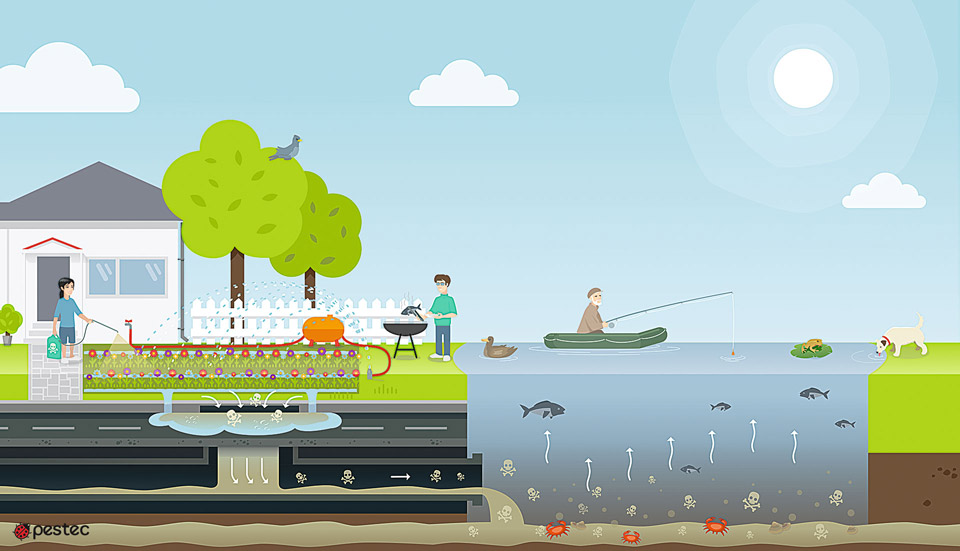
Would you knowingly poison your local creek, reservoir or the Bay? Of course not, however, you might be one of the millions of Americans who unknowingly contributes to water pollution. For instance, you spray weed killer on your lawn early morning. It then gets flushed down the sidewalk into the storm drain by the afternoon rain. This stormwater runoff ultimately ends up in creeks, streams and eventually the Bay where it impacts the bottom food chain and ecosystem.
Stormwater runoff is water from rain or melting snow that flows across the ground or pavement instead of seeping into the soil. This runoff carries pollutants to storm drains and these drains flow directly into waterways. Unlike sewage systems, the water in storm systems is not treated before it arrives in rivers, lakes or oceans. That is why stormwater runoff is a major source of water pollution.
One of the many pollutants that make their way into storm drain systems are pesticides. This can include insecticides, herbicides, and fungicides. The potential results of stormwater pollution are contaminated drinking water, injury to aquatic plants and animals, and restrictions on swimming, fishing and other recreational uses.
Join us in preventing stormwater runoff pesticide pollution in our communities by using the tips below.
- Use non-chemical Integrated Pest Management (IPM) practices as an alternative to pesticides - planting pest and drought resistant flowers and plants, reduce irrigation, and weatherize your home.
- Mow your lawn less often. Try to keep your lawn at least 3" in height to minimize weed growth, reduce the need for watering, and decrease the likelihood of pests.
- Recognize that all bugs are not all bad. They are the food for lizards and birds and an indicator of a healthy environment. Focus on controlling the pests that get inside or damage your garden or pose a risk to your home, garden, or family.
- Use beneficial insects like ladybugs to eat up destructive pests like aphids on your plants. Let spiders eat the mosquitoes that might otherwise bite your family. Let the California Blue Mud Dauber eat its favorite food, Black Widows, by not destroying its home or the home of its brethren. They all eat spiders!
- Purchase household and garden products from your local hardware store that are "least toxic" to the environment, like insecticidal soap. Soaps kill aphids and other pests on contact while posing little risk to you or the environment.
- Use containerized baits for exterior treatment of ants and cockroaches instead of a perimeter spray to prevent runoff. Ants and cockroaches need water and are on the hunt for food. By placing these baits where they like to hide you make it easy for them to find it and to keep them from coming inside looking for more.
- If you must use pesticides, do so carefully and sparingly - Follow directions on the pesticide label and apply them where the pests are found. Usually in cracks and crevices and under potted plants, pavers, and other ground covers.
- Don't apply pesticides if it is windy or if rain is expected to prevent drift and runoff.
- Avoid applying pesticides to sidewalks, driveways or other hard surfaces because the rain could carry them into storm drains.
- Hire a professional company that follows best practices. Look for third party audited and certified IPM service providers.